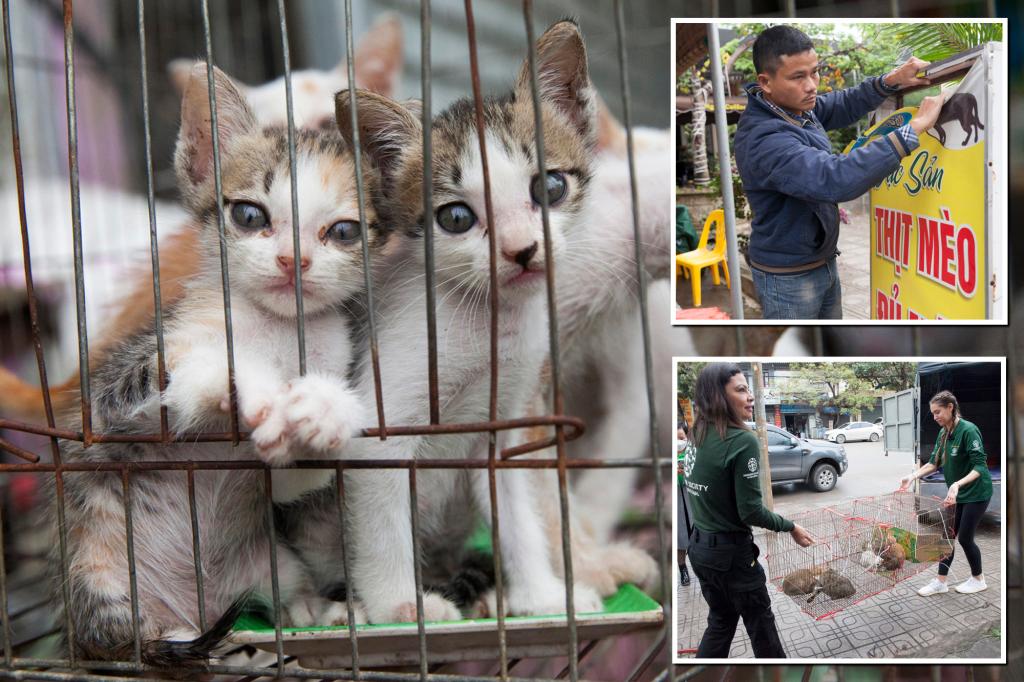A Vietnamese restaurant that slaughtered up to 300 cats a month for a stomach-churning soup recipe was shut down this month after its owner voiced moral concerns with the practice.
Pham Quoc Doanh, 37, abruptly tore down a sign advertising cat meat – known as ”thịt một” – outside his Gia Bảo restaurant in Thái Nguyễn’s Thịnh Đán ward in early December, Humane Society International (HSI) announced.
As a result, 20 cats and kittens that would have been drowned to meet the restaurant’s demand were freed and put up for local adoption, the organization said.
Doanh never wanted to sell cat meat – which is quite a popular dish in Vietnam – but was cornered into the market to support his family, he told Metro.
“Before selling cat meat in this restaurant I prepared other normal food and drinks. However, the income is not enough to cover the cost of living for my family,” explained the father of two children.
“At that time I tried to sell cat meat because there was no other restaurant that prepared this food in the area,” he said.
Twenty cats were freed when a Vietnamese restaurant owner closed his cat meat shop this month. Chau Doan / AP image for HSI Pham Quoc Doanh tore down a sign advertising cat meat. Chau Doan / AP image for HSI
About one million cats – mostly stolen pets and strays – are killed for meat each year in Vietnam, HSI said.
Surveys show that 87% of people in Vietnam have a pet that was mysteriously stolen, or know someone whose pet was taken, he added.
Doanh drowned the doomed cats in buckets by holding them with sticks in buckets of water, he told Metro.
Humane Society International workers help relocate rescued cats. Chau Doan / AP image for HSI
“I feel sorry to see them suffer during slaughtering. It’s all about money because I have to make money for my whole family,” he lamented.
Frustrated by his lack of clear options, Doanh contacted HSI and, as part of the organization’s Model for Change program, received a one-time grant to close his restaurant and set up a grocery store instead.
Models for Change has been operating in South Korea since 2015, and launched in Vietnam last year, HSI said.
“For some time now I have felt a sincere desire to leave the cruel cat meat business and move on to something else as soon as possible. When I think of all the thousands of cats that I have slaughtered and served here over the years, it is upsetting,” Doanh said in an official HSI statement.
Cat meat is a popular restaurant dish in Vietnam. Chau Doan / AP image for HSI
“Cat theft is so common in Viet Nam that I know most of the cats sold here are someone’s beloved family friend, and I feel very sorry about that. I am happy to know that thanks to HSI, my wife and I can now put the cat meat trade behind us and start over, still serving my local community but no longer part of this cruel and crime-driven trade,” he continued. .
“I want to see a ban on dog and cat meat trade in Vietnam.
The cats freed from the Doanh slaughterhouse were taken to a specially designed shelter at the Thai Nguyen University of Agriculture and Forestry to be vaccinated against rabies before being adopted, HSI added.
“We are very excited to close our first cat meat trade business in Viet Nam, and hope it will be the first of many as more people like Mr. Doanh turn away from this cruel trade,” Quang Nguyen, Vietnam Humane Society International animal partner and manager engagement program.
Rescued cats are being vaccinated against rabies. Chau Doan / AP image for HSI
“Although most Vietnamese do not eat cat meat, the belief persists that consumption can cure bad luck, and the scale of suffering is astounding. “These 20 lucky cats and kittens have escaped a terrible fate and will be found in loving homes, but our work continues to see a nationwide ban on the cat meat trade that brings pain and hardship to so many,” she said.
The cat meat industry is difficult to track, because the animals are not considered livestock and therefore farmers do not need to register data on them, Metro explained.
“Now that I have closed down my cat slaughter business, I feel calmer in my mind and feel confident and happy about my future without killing any more animals,” Doanh told the outlet.
“I will supply many products such as drinks, tobacco, sweets, dry food such as instant noodles, and otherwise support my family that way,” he said.
Categories: Trending
Source: thtrangdai.edu.vn/en/



